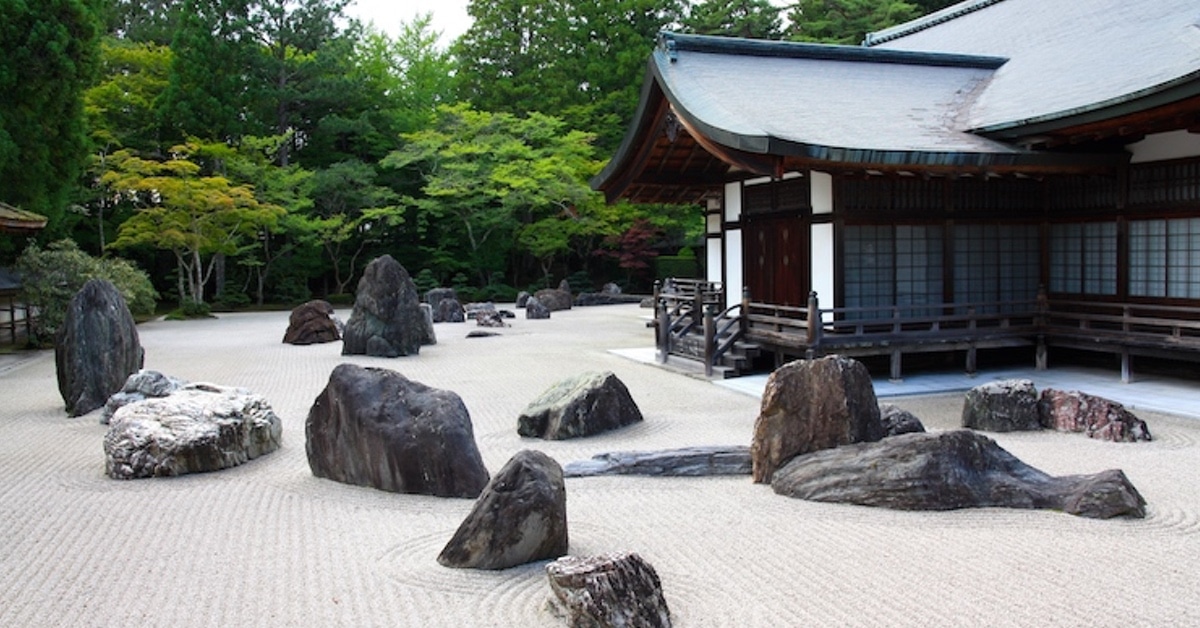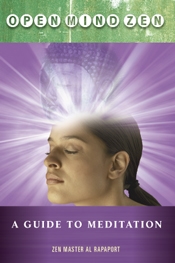
Open Mind Zen Book
A Book by Al Rapaport

Open Mind Zen The Book! Now available!
This is a great book for those considering starting a meditation practice
or those interested in the Open Mind Zen system of study.
Cost including postage is $14.50
Pay through Paypal by clicking the button below
or make checks out to Open Mind Zen and mail to:
2007A Pennwood Dr, Melbourne, FL 32901
Click here to pay via Paypal:
About the Book
The word Zen has become a popular one in modern media, but few readers have even an intellectual understanding as to what Zen really is, much less an experiential one. Open Mind Zen uses plain English to demystify an ancient, Eastern method of self-realization and make it accessible to those without a background in Eastern spiritual practices.
Open Mind Zen is a concise, easy to read text with short chapters designed to be carefully read and meditated upon. It cuts through the cultural baggage and mumbo jumbo you will find in many other books on this topic.
Open Mind Zen is written for the lay practitioner by a lay teacher with the understanding that few of us desire to abandon our life, work & family to practice meditation. It shows us how we can learn to meditate and deepen our awareness in the midst of daily life.
About the Author
Al Rapaport is the originator of Open Mind Zen, a unique system of meditation study. He has over 35 years experience practicing and teaching Zen, and is one of only a few lay Zen teachers. Al developed and produced the Buddhism in America Conferences in Boston, San Diego, and Colorado & the Tricycle Buddhism Conference in New York City. He currently directs the Open Mind Zen Center in Melbourne, FL.
Free Preview
Master Kempo,
“ The Bhagavats of the ten directions have one way to Nirvana. I wonder what this one way is.” A monk once asked. Kempo held up his stick, drew a line, and said, “Here it is!”
– Mumonkan, Case 48
What is freedom, and can human beings really experience it? How can we say that the world is perfect as it is when it often appears to be the opposite? To gain an understanding of Zen teaching on this point, we need to see that there are two ways of looking at this issue. One is the relative side, which is that the world is never going to be perfect, that there will always be problems. But then there is also what we in Zen practice call the absolute side, which is that from the perspective of wholeness or oneness the entire universe is perfect the way it is, suffering and all. For someone who has achieved this perspective, the earth with all its imperfection is the enlightened Buddha-mindfield. So, whether this earth is a minefield or a Buddha-mindfield depends on how we experience it.
To truly experience freedom, we have to be able to see things from both the relative and the absolute perspective and not get stuck in either one. To be attached to the relative level means that we believe that just a little more money, a little larger SUV, a little larger house or a little better relationship will give us the freedom we need. The problem is, no matter how much we get, it just doesn’t seem to do the trick. All those extra things require maintenance, and more and more of our time goes to creating and maintaining this kind of material wealth. Then we wonder why we aren’t as happy as we’re told by the advertising we should be!
On the other hand, if we have some kind of spiritual beyond body experience we can just as easily get so attached to it that we cannot drop it to see the relative world around us when necessary. Life is not always perfect and wonderful – there is suffering, pain and destruction all around us, and we need to be able to empathize with those that are suffering in order to do any good. Sometimes life is calm and clear, and other times it is terrible and chaotic, so to be able to freely move between functioning in the relative while seeing the absolute state underlying all reality is very important to a spiritual understanding. Zen practice is about letting go of the relative self in order to realize oneness, but then after you have that experience of awakening, letting go of that so you can go on to the next stage. This is a very subtle point that many spiritual systems do not address, that it is necessary to avoid getting attached to both the relative aspect of life and the universal aspect. We have to be able to freely move between them. We need to be able to function in the relative world, to keep clean, to eat food, to relate well to others, but at the same time we need to be able to see the oneness of the entire universe. Nothing can be left out, or we are not truly free.
So, what is freedom? Well, if it was a fixed state of being of some type, it wouldn’t be totally free. Zen teaching is that any fixed state is a trap sooner or later. Could it be that freedom is simply the realization that we can choose at any time, and in any situation? Doesn’t this define freedom itself, that whatever happens we can choose – choose to go right or left, to do good or evil, to live or die? If we take any option off the table, whether it be ego, anger, lust, or selflessness, clarity and enlightenment, we limit our options and our freedom. We have an infinite range of tools to use in our tool chest – why not keep them all handy? In Zen training we use meditation as a way of learning how deeply our ability to choose goes.
Meditation is simply being aware of our own lives, of what we have created. We take our attention, which is normally focused outside, and turn it inward. What do we see when we turn our attention inward and start noticing our own body and mind? At first we see whatever we’ve created in our life, and that creation usually feels stuck in some way. We don’t feel free because of conditioned patterns that keep us in certain narrow parameters of experience. The fact is that we are always free. We just need to free ourselves from the feeling that we aren’t.